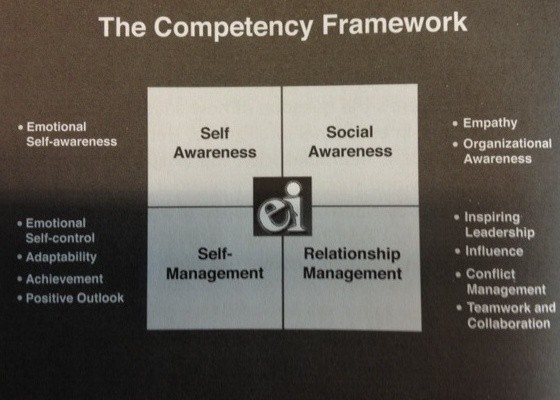
“Tuning in to how we’re feeling ourselves plays a central role in how we sense and understand what someone else is feeling” – Daniel Goleman in: The brain and emotional intelligence, new insights.
Tag: Emotional Intelligence
About moods, leadership and the social brain

Tying onto one of my last posts on emotional intelligence and leadership, it struck me how much moods and our emotional states have an impact not only on our own working results but also on those of others and maybe even of a whole organization. As scientists have discovered, our emotional centers in the brain are so-called “open-loop” systems who depend largely on external sources to manage themselves.
As Daniel Goleman writes in his book Leadership, the power of emotional intelligence, “(…)one person transmits signals that can alter hormone levels, cardiovascular function etc. in the body of another” person (page 70). This mechanism was an important one in human evolution as it allows a mother to bond emotionally with her child for example. Even though we don’t really notice that this process is going on, scientists were able to prove that when two people meet and pay full attention to each other, putting aside all distractions as well as being in synch non-verbally, a phenomenon called “mirroring” will happen. This means that the physiological profiles of the two interacting people will look very similar at a certain point.
The same happens, when people work together in an office, a shop floor etc. People will somehow “catch” the feelings of their co-workers, sharing moods, good or bad.
Why does this matter so much? Well, first of all it shows the impact moods have on the overall climate in an office, at home or wherever we are. What is also important from an organizational perspective is that people usually take their emotional cues from the top (Goleman, Leadership, page 72). The attitude and the mood of the leader,the manager etc. will have an enormous impact on his or her direct reports.
Luckily, cheerful moods and laughter spread much easier than negative ones or even depression. But if constantly confronted with these negative attitudes and moods the whole climate of an organization will finaly be affected.
Increases in anxiety, stress or worry will make people less “emotionally intelligent” (Goleman, Leadership, page 77). Our cognitive efficiency erodes and the brain cannot operate at full performance anymore. Motivation goes down, challenges suddenly become overwhelming
and we are simply not able anymore to solve problems creatively. With high levels of anxiety and stress the brain secretes high levels of cortisol and norepinephrine, two substances which will interfere with the smooth operation of learning and memory. (Goleman, Leadership, page 90). At a certain point the person won’t be able to take more levels of stress and become sick and or break down (which can be observed quite often in our Western societies nowadays).
Interesting, don’t you think, how just by being an “emotional intelligent” leader, knowing when to apply which leadership style and how important moods are you can:
I wish it would be so simple!
I hope you enjoyed reading this article! Have an excellent weekend,
Jenny
Emotional Intelligence applied to Leadership
Currently I am reading a very interesting book from Daniel Goleman on Leadership and the “Power of Emotional Intelligence”. Dr. Goleman specializes in psychology and brain sciences and thus applies the concepts of mindfulness to leadership, i.e. what it takes to become an outstanding leader. Most interestingly, he found out that it is not the IQ or technical skills that matter at the highest level, but rather the “Emotional Intelligence” (EI) abilities.
Dr. Goleman proposes a so-called “competency-framework” to describe how the fundamentals of EI translate into job success; two of these components are related to dealing with one self. Two others concern the ability to manage other people as well as relationships with others.

From D. Goleman: “Leadership – The power of Emotional Intelligence, Selected writings”. 2011 Northampton MA, page 14.
- Self-Awareness: Having a deep understanding of one’s emotions, strengths, weaknesses, needs and drives. People who are self-aware, are in fact honest with themselves and with others. They know what they can do and what they cannot as well as how their feelings and emotions affect themselves and others around them.
- Self-Management: This actually means that although we all have feelings, impulses and emotions, some of us have found ways to control these and channel them in useful ways, in order to bring out our inner core and creativity (as Personal Leadership would put it).
- Social Awareness: Nowadays, team leaders must be able to sense and understand the viewpoints of everyone around the (virtual) table. Cross-cultural dialogue and understanding is even more important now than before as our worlds become more and more globalized. Being able to put yourself into the shoes of somebody else to understand how he/she feels and at a larger scale, reading the organizational decision networks and currents are absolutely a must.
- Relationship Management: Competent people here work following the assumption that nothing important gets done alone. They are effective in managing relationships, putting relevant networks in place that they can draw upon even if only at a later stage. All other components play into this last one as “no leader is an island” according to Dr. Goleman.
What does this mean for us? Well, it shows again very nicely how being ‘mindful’ and in line with yourself, understanding your own feelings/emotions and being able to interpret them affects others in a positive and effective way. Leading yourself adequately and being aware of your own constraints, culture, worldviews and abilities plus being willing to learn and move forward on the path of “emotional intelligence” will certainly have a major impact on how you will lead others.
Thanks for reading and feel free to contact me for more info/advice, Jenny
Further reading:
- Emotional Intelligence in Business: http://www.psychometric-success.com/emotional-intelligence/emotional-intelligence-in-business.htm
- Forbes: Daniel Goleman and the Power of Emotional Intelligence: http://www.forbes.com/sites/danschawbel/2011/09/15/daniel-goleman-on-leadership-and-the-power-of-emotional-intelligence/
- Daniel Goleman, Ph.D.: http://www.eiconsortium.org/members/goleman.htm
- The Emotional Competence Framework: http://www.businessballs.com/emotionalintelligencecompetencies.pdf
- Emotional Intelligence: http://danielgoleman.info/topics/emotional-intelligence/
Related articles
- Increasing Emotional Intelligence – Daniel Goleman’s Emotional Intelligence Speech Shares Indicators (TrendHunter.com) (trendhunter.com)
- What in the world is Emotional Intelligence? (noecanales.wordpress.com)
